
|
Unsold Lots - Sale 61
If interested, call 1-310-551-2646 or send email to info@goldbergcoins.com
|
Photo |
Description |
Asking |
Lot 313 |
 |
Arthur, Chester A (1829-1886) 21st President of the United States (1881-1885). Civil War-date Letter Signed "C A Arthur" as Engineer in Chief and Acting Assistant Quartermaster General, one page, 8 x 6¼ in., Quarter Master General Bureau, Division Army N. York, April 22, 1861. Ten days after the first engagement of the Civil War took place at Fort Sumter, Chester Arthur writes to Major General H.B. Duryea searching for a location to assemble Army volunteers. In part: "I desire to use the arsenal in Brooklyn as a Depot for volunteers mustered into the service, and shall send Col Lansings command there as mustered providing you do not want to make other use of it." General Duryea responds on the verso that he wants to use the Brooklyn arsenal for arms and for drilling and that it can't be used for volunteer forces. Fine.
Arthur joined the New York state militia in 1858 and served until 1862. He was promoted to quartermaster general and was responsible for provisioning and housing the several hundred thousand soldiers supplied by the state to the federal cause, as well as for the defenses of New York. From 1871-78, Arthur was the Collector of the Port of New York. In 1881, he was elected Vice President under President James Garfield and when Garfield was assassinated in 1881, he succeeded to the presidency.
Estimated Value $1,200 - 1,500.
| Asking Price
$1,850 |
Lot 314 |
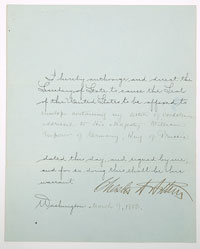 |
Arthur, Chester A. Partly-printed Document Signed "Chester A Arthur" as President, one page, 10 x 8 in., Washington, March 7, 1883. The document, which is accomplished in manuscript, orders the Secretary of State to affix the Seal of the United States to an "envelope containing my letter of condolence addressed to His Majesty William Emperor of Germany, King of Prussia…." On January 21, 1883, Prince Frederick Charles Alexander of Prussia, the 81-year-old-brother of Wilhelm. had died. His last words were, "Long live the Emperor."
Wilhelm I (1797-1888), was emperor of Germany (1871-88) and king of Prussia (1861-88). He became regent in 1858 when his brother, King Frederick Wilhelm IV was declared insane, and king of Prussia upon his brother's death. With Otto von Bismarck as his chancellor, Wilhelm oversaw the unification of Germany and its emergence as a European power. After the Franco-Prussian War of 1870-71, he received the surrender of Napoleon III at Sedan and was proclaimed emperor of Germany in the Hall of Mirrors at Versailles on January 18, 1871.
Estimated Value $1,000 - 1,250.
| Asking Price
$1,850 |
Lot 315 |
 |
Arthur, Chester A (1830-1886) 21st president of the United States (1881-85); he succeeded to the presidency after Garfield's assassination. Check Signed "C.A. Arthur," and executed by him, New York, June 22, 1875. Written on The Nassau Bank and paid to the order of George Hillier for $200.00. Stamp cancellation does not touch Arthur's large signature. Fine.
Estimated Value $500 - 600.
| Asking Price
$450 |
Lot 317 |
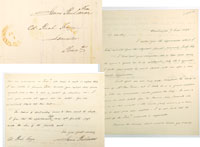 |
Buchanan, James. Autograph Letter Signed "James Buchanan" as U.S. Senator, 2 pages, Washington, June 7, 1842. With Free Franked holograph address leaf. To Col. Reah Frazer in Lancaster, Pa., expressing his opposition to bringing back Martin Van Buren as the Democrats' presidential nominee in 1844. In part: "Great efforts are now being made throughout the Country in favor of Mr. Van Buren; but I think it is a general impression here that his nomination would jeopard the party. In order to succeed we must detach from the Harrison party Democrats who left us on that occasion & who would gladly return, if a new man & new issues were adopted. I do not think that the prospect for the Penna. candidate is unfavorable…." Very fine.
President William Henry Harrison had been the first Whig to gain the presidency. When he died after only a month in office, and John Tyler, his Vice President, took over, the Democrats started a movement to bring back Martin Van Buren in an effort to regain the office of the presidency, which they had held since 1829. Here James Buchanan advises against such a movement, and when the Democrats convened in Baltimore in May 1944, Buchanan was one of those who eroded support for Van Buren, resulting in the nomination of dark-horse candidate James K. Polk. When Polk was elected, he appointed Buchanan his Secretary of State.
Estimated Value $2,000 - 2,500.
| Asking Price
$2,850 |
Lot 319 |
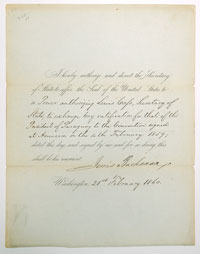 |
Buchanan, James. Partly-printed Document Signed "James Buchanan" as President, one page, 10½ x 8 in., Washington, Feb. 21, 1860. Accomplished in manuscript. Ordering the Secretary of State to affix the Seal of the United States to "a Power authorizing Lewis Cass, Secretary of State, to exchange my ratification for that of the President of Paraguay to the Convention signed at Asuncion on the 4th February 1859…." A horizontal fold runs lightly through the large, bold signature, else fine.
In February 1855, the U.S.S. Water Witch had been fired upon by Paraguayan forces when it sailed without authorization into Paraguay's waters. The pilot on the American ship was killed in the incident, and relations between the two nations were thereafter very strained. In 1858, Buchanan sent James B. Bowlin, a former Missouri congressmanan, with a Naval squadron to demand redress from Paraguay. After two weeks of negotiations with Paraguayan dictator Carlos Antonio López, the dispute was resolved peacefully. The family of the slain Water Witch crewman was indemnified, and the United States received an apology and an advantageous commercial treaty with Paraguay. Gunboat diplomacy at work!
Estimated Value $1,200 - 1,500.
| Asking Price
$1,850 |
Lot 320 |
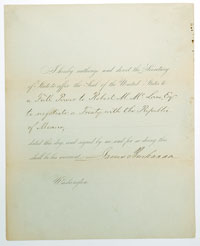 |
Buchanan, James. Partly-printed Document Signed "James Buchanan" as President, one page, 10 x 8 in., Washington, n.d. but 1859. Accomplished in manuscript. Ordering the Secretary of State to affix the Seal of the United States to "a Full Power to Robert M. McLane, Esqr. to negotiate a Treaty with the Republic of Mexico…." Large, bold signature. Lightly toned, else fine.
Former congressman and U.S. Commissioner to China, Robert M. McLane was named U.S. Minister to Mexico by President Buchanan on March 7, 1859, during a period of revolutionary turmoil in Mexico. McLane was instructed to recognize the government of Benito Juarez, then at Vera Cruz, which he did in April.
On December 14, 1859, McLane signed the McLane-Ocampo Treaty, formally the Treaty of Transit and Commerce, by which Mexico would sell the perpetual right of transit to the Isthmus of Tehuantepec to the U.S. for $4 million, only $2 million of which was to be paid immediately (the remainder to be held in the U.S. for payment to American citizens suing the Mexican government for damages). All transit would be free and Mexican troops would aid in the enforcement of the rights granted the U.S. President Juarez was willing to sign because he needed money to finance his war against the Conservative Party. President Buchanan favored the treaty but in May 1860, the U.S. Senate rejected the treaty and the convention. Because of the impending Civil War at home, McLane did not return to Mexico.
Estimated Value $1,200 - 1,500.
| Asking Price
$1,900 |
Lot 321 |
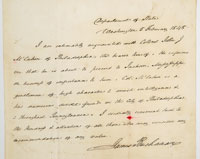 |
Buchanan, James. Autograph Letter Signed "James Buchanan" as Secretary of State, one page, 10 x 8 in., Washington, February 5, 1848. Being a letter of introduction for Colonel John J. McCahen. Buchanan writes, in full: "I am intimately acquainted with Colonel John J. McCahen of Philadelphia, the bearer hereof. He informs me that he is about to proceed to Jackson, Mississippi, on business of importance to him. Col. McCahen is a gentleman of high character & much intelligence & has numerous devoted friends in the City of Philadelphia & throughout Pennsylvania. I cordially commend him to the kindness & attention of all those who may consider my recommendation of any value." Fine; a small red stain has bled from the verso of the integral blank, leaving a small spot on the recto, which does not affect the text. Boldly penned and signed.
Estimated Value $1,000 - 1,500.
| Asking Price
$500 |
Lot 322 |
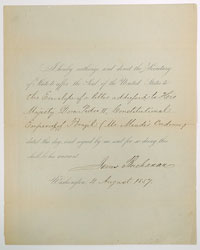 |
Buchanan, James. Partly-printed Document Signed "James Buchanan" as President, one page, 10 x 8 in., Washington, Aug. 4, 1857. Accomplished in manuscript. Ordering the Secretary of State to affix the Seal of the United States to "the Envelope of a letter addressed to His Majesty Dom Pedro II, Constitutional Emperor of Brazil (Mr. Meade's Credence)…." Large, bold signature. Light toning, else fine.
Richard Kidder Meade (1803-1862) was a congressman from Virginia when President Buchanan appointed him minister to Brazil. He served until 1861, when the American Civil War broke out. He returned to the United States and devoted himself to the Confederacy for the last year of his life.
Brazil was ruled by Dom Pedro II (1825-1891), the second and last emperor of Brazil. Dom Pedro was liberal in outlook, a champion of the arts and sciences, and a friend of renowned scholars, poets, and musicians. He ruled from 1841-1889 and was popular with his people but was ousted by a military coup in 1889. He had long pushed for the abolition of slavery, but it was not until 1888 that it was signed into law, making Brazil the last country to formally abolish slavery.
Estimated Value $800 - 1,000.
| Asking Price
$900 |
Lot 323 |
 |
Bush, George H.W. and Bill Clinton. Color Photograph Signed "Bill Clinton" and George Bush" and inscribed in another hand to "Adrienne Colemann / Best wishes," 9½ x 7½ in., n.d. The three Presidents are dressed for golf. The photo is housed in an 11½ x 9½ in. standing frame. Very fine. Adrienne Coleman is a former Secret Service agent.
Estimated Value $300 - 500.
| Asking Price
$250 |
Lot 324 |
 |
[Bush, George W. and Laura]. Three hand-painted Christmas ornaments presented by President and Mrs. Bush in 2004, 2006, and 2008 to staff and friends. Each ornament is dated, numbered and signed by the artist and is in its original box which has an image of the White House on the cover and a Certificate of Authenticity laid into the inside of the cover. The 2004 (edition of 925) and 2006 (edition of 1,000) ornaments were designed and hand-painted by American folk artist Seton McGlennon. The 2008 ornament (edition of 1,000) was designed and hand-painted by Barbara Franzreb. All in excellent condition.
Estimated Value $400 - 600.
| Asking Price
$350 |
Lot 328 |
 |
Cleveland, Grover. Autograph Manuscript Signed "Grover Cleveland," 2½ pages, 10 x 7¾ in., n.p., n.d. These pages are part of a speech on patriotism and holiday observance that Cleveland gave to the Union League Club of Chicago in 1907 on Washington's birthday, February 22. In this speech, the ex-President gives a lesson in civics and defines good citizenship.
In part: "I indulge in no mere figure of speech when I say that our Nation--the immortal spirits of our domain--lives in us, in our hearts, and minds, and consciences. There it must find its nutriment or die. This strength more than any other, presents to our minds the impression of and responsibility of American Citizenship. The land we live in seems to be strong and active. But how fares it with the land that lives in us? Are we sure that we are doing all we ought, to keep it in vigor and health? Are we keeping its roots well surrounded by the fertile soil of living allegiance, and are we furnishing them the invigorating moisture of unselfish fidelity. Are we as diligent as we ought to be to protect this precious growth against the poison that must arise from the doing of harmony, and honesty, and industry and frugality; and are we sufficiently watchful against the deadly…pests of consuming greed and cankerous cupidity? Our answers to these questions make up the account of our stewardship as keeps of a sacred trust. The land we live in is safe so long as we are dutifully careful of the land that lives in us….If we would bestow…the care it needs, it is indispensable that we should recognize the weakness of our human nature, and our susceptibility to temptations and influences that interfere with a full conception of our obligations….there is in my mind a sober conviction that we all can and ought, to do more for the Country that lives in us, than it has been our habit to do; and that no better means to this end are at hand than a revival of pure, patriotic affection for our Country for its own sake, and the acceptance…of the virtues which Washington regarded as all that was necessary to make us a great and happy people, and which he declared to be 'the great and essential pillars of public felicity'--harmony, honesty, industry, and frugality."
Boldly penned and signed in black ink. Minor soiling and some light dampstaining, not affecting legibility of the text and not touching the signature.
Estimated Value $6,000 - 8,000.
| Asking Price
$12,500 |
Lot 329 |
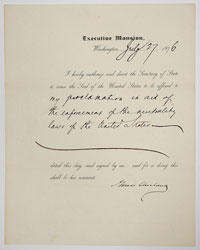 |
Cleveland, Grover. Partly-printed Document Signed "Grover Cleveland" as President, one page, 10 x 8 in., Executive Mansion, Washington, July 27, 1896. Ordering the Secretary of State to "cause the Seal of the United States to be affixed to my proclamation in aid of the enforcement of the neutrality laws of the United States…."
Here is the text of the proclamation to which the Seal was affixed on July 27, 1896:
"Whereas by a proclamation dated the 12th day of June, A.D. 1895, attention was called to the serious civil disturbances, accompanied by armed resistance to the established Government of Spain, then prevailing in the island of Cuba, and citizens of the United States and all other persons were admonished to abstain from taking part in such disturbances in contravention of the neutrality laws of the United States; and Whereas said civil disturbances and armed resistance to the authority of Spain, a power with which the United States are on terms of peace and amity, continue to prevail in said island of Cuba; and
Whereas since the date of said proclamation said neutrality laws of the United States have been the subject of authoritative exposition by the judicial tribunal of last resort, and it has thus been declared that any combination of persons organized in the United States for the purpose of proceeding to and making war upon a foreign country with which the United States are at peace, and provided with arms to be used for such purpose, constitutes a "military expedition or enterprise" within the meaning of said neutrality laws, and that the providing or preparing of the means for such "military expedition or enterprise," which is expressly prohibited by said laws, includes furnishing or aiding in transportation for such "military expedition or enterprise;" and
Whereas, by express enactment, if two or more persons conspire to commit an offense against the United States any act of one conspirator to effect the object of such conspiracy renders all the conspirators liable to fine and imprisonment; and
Whereas there is reason to believe that citizens of the United States and others within their jurisdiction fail to apprehend the meaning and operation of the neutrality laws of the United States as authoritatively interpreted as aforesaid, and may be misled into participation in transactions which are violations of said laws and will render them liable to the severe penalties provided for such violations:
Now, therefore, that the laws above referred to, as judicially construed, may be duly executed, that the international obligations of the United States may be fully satisfied, and that their citizens and all others within their jurisdiction, being seasonably apprised of their legal duty in the premises, may abstain from disobedience to the laws of the United States and thereby escape the forfeitures and penalties legally consequent thereon, I, Grover Cleveland, President of the United States, do hereby solemnly warn all citizens of the United States and all others within their jurisdiction against violations of the said laws, interpreted as hereinbefore explained, and give notice that all such violations will be vigorously prosecuted; and I do hereby invoke the cooperation of all good citizens in the enforcement of said laws and in the detection and apprehension of any offenders against the same, and do hereby enjoin upon all the executive officers of the United States the utmost diligence in preventing, prosecuting, and punishing any infractions thereof.
Done at the city of Washington, this 27th day of July, A. D. 1896, and of the Independence of the United States the one hundred and twenty-first. GROVER CLEVELAND.
For close to half a century, Americans had sympathized with, and even died while participating in Cuban attempts at independence from Spain. Because of Cuba's closeness to Central America and the canal which was projected to be built there, as well as American business interests in Cuba, the U.S. government closely watched events there. When the Spanish military commander, Valeriano Weyler y Nicolau, herded some 500,000 people into concentration camps, horrific stories of their abuse reached the U.S.; "yellow journalism," practiced by William Randolph Hearst's New York Journal and Joseph Pulitzer's New York World, further inflamed the public. In this atmosphere, Cleveland issued his proclamation of neutrality. It would barely hold until early 1898, when the U.S. battleship Maine was sunk in Havana harbor, and the Spanish American war began.
Estimated Value $6,000 - 8,000.
| Asking Price
$12,500 |
Lot 330 |
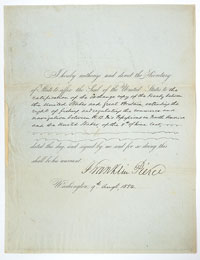 |
Pierce, Franklin. Partly-printed Document Signed "Franklin Pierce" as President, one page, 10½ x 8 in., Executive Mansion, Washington, July 27, 1896. Ordering the Secretary of State to "cause the Seal of the United States to be affixed to the ratification of the exchange copy of the treaty between the United States and Great Britain, extending the right of fishing, and regulating the commerce and navigation between H[er] B[ritannic] M[ajesty]'s Possessions in North America and the United States, of the 5th of June last…." Small mounting remnant at left edge, affecting nothing, else fine. Pierce's large, bold signature is in black ink.
Until 1846, Great Britain protected its economy and that of its empire, including Canada, with a system of preferential tariff rights; that year, however, Great Britain abrogated the Corn Laws which gave Canadian agricultural producers advantageous customs duties. The economic situation in Canada was bleak so Canada turned to the United States.for new export opportunities. Lord Elgin, who was governor general of Canada, attempted to interest Washington in a reciprocity treaty, but the U.S. saw no advantages in such a treaty until American fishermen were offered fishing rights to Atlantic fisheries north of the thirty-sixth parallel and most Canadian produce and raw materials were listed as goods reciprocally duty-free.A ten-year treaty was signed in 1854, renewable annually.The U.S. did not renew the treaty in 1866, largely because of pressure from America's protectionist circles. A primary reason for the creation of the Canadian Confederation in 1867 was the need to find new markets to sell products from British colonies.
Estimated Value $4,000 - 6,000.
| Asking Price
$9,500 |
Lot 331 |
 |
Cleveland, Grover. Autograph Letter Signed "Grover Cleveland" as Governor of New York, on Executive Chamber stationery, 1½ pages, 7¾ x 4¾ in. To an unidentified general ("My dear General"), regarding the Red Cross. In part, "…The American Association of the Red Cross has for its object, as I understand it, the alleviation of human suffering. I very cheerfully give my support and encouragement to such an undertaking. I am much gratified by the invitation to be your guest on Evacuation day…" Fine; one mounting strip on verso of one edge of the integral leaf, affecting nothing. The American Red Cross was a fledgling organization when Cleveland wrote this letter; it was founded by Clara Barton in 1881 in Washington, D.C.
Estimated Value $3,000 - 5,000.
| Asking Price
$9,500 |
Lot 332 |
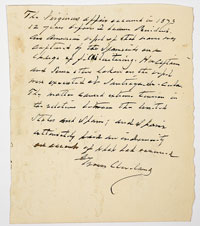 |
Cleveland, Grover. Autograph Manuscript Signed "Grover Cleveland" as President, one page, 5¾ x 4¾ in., n.p., n.d. As American public opinion grows angrier at reports of Spanish atrocities, President Cleveland starts to rethink the Neutrality Proclamation which he signed on June 12, 1895, and which refused to show any preference to the insurgents who were attempting to free Cuba from Spain. Here he writes an account of the Virginius affair, which had aroused the ire of the American public some years earlier: "The Virgin[i]us affair occurred in 1873 12 years before I became President. An American vessel of that name was captured by the Spaniards on a charge of fillibustering. Her captain and some others taken on the vessel were executed at Santiago de Cuba. The matter caused extreme tension in the relations between the United States and Spain; and Spain ultimately paid an indemnity on account of what had occurred." Light toning and soiling; several contemporary ink smears.
The Virginius was a former Civil War era blockade runner side-wheel steamer. It was captured off Morant Bay, Jamaica, by the Spanish vessel Tornado, and taken to Santiago de Cuba. where 53 people--crew members and passengers--were summarily court martialed on the charge of filibusterng (actively supporting the Cuban insurrectionists against Spain) and executed as pirates.
Earlier attempts at filibustering had been made, including one by Narcisco Lopez in 1850 and again in 1851, assisted by Southerners who hoped Cuba would join the Union as a slave state. The second attempt resulted in Lopez' execution, as well as that of Col. William Crittenden and many other Americans.
Estimated Value $3,000 - 5,000.
| Asking Price
$7,500 |
Lot 333 |
 |
Cleveland, Grover (1837-1008) 22nd and 24th President of the United States (1885-89, 1893-97). Autograph Letter Signed "Grover Cleveland," on Bangs Stetson Tracy & MacVeach letterhead, 2 pages, 10¼ x 8 in., New York, June 26, 1889. To Mr Perry, regretting that he cannot participate in the Fourth of July celebration at Woodbury and ruminating on how that day, "the day on which a nation of brave and independent freemen was born," should be celebrated. In part, "It seems to me that the condition of American patriotism and our national pride in all we are and all that we hold meaningful may be measured by the zeal and order with which the Fourth of July is celebrated…." The ink is somewhat light and outer edges are light from previous framing; otherwise, fine.
Estimated Value $1,000 - 1,200.
| Asking Price
$1,900 |
Lot 334 |
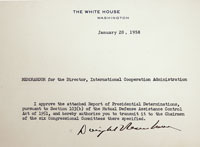 |
Eisenhower, Dwight D (1890-1961) 34th President of the United States (1953-1961); Supreme Commander of Allied Forces in World War II. Typed Document Signed "Dwight D. Eisenhower" as President, on The White House letterhead, one page, 10½ x 8 in., Washington, Jan. 20, 1958. Being a "Memorandum for the Director, International Cooperation Administration," approving a "Report of Presidential Determinations, pursuant to Section 103(b) of the Mutual Defense Assistance Control Act of 1951…." Very fine.
Estimated Value $500 - 700.
| Asking Price
$400 |
Lot 335 |
 |
Eisenhower, Dwight D. & Mamie Doud Eisenhower. Photograph Signed as President and First Lady, 13 x 9¼ in., n.p., n.d. (1954). The First Couple stand on the ramp of Air Force One (Columbine) on August 21, 1954, on their way to Denver, Colorado. The printed inscription says, "For Sergeant Wayman I. McGarrh with appreciation of fine services at the White House and with best wishes for the future." The Columbine departed from Andrews Air Base in Washington, D.C. Photo by Abbie Rowe of the National Park Service. Fine except for a couple of minor creases at bottom and some ink skips in Mamie's signature. Handsomely matted and framed to an overall size of 19½ x 15¾ in. An uncommonly large and attractive photo of Ike and Mamie. With a dinner plate from the Columbine, engraved "D.D.E." under a floral spray on the front and on the back: "The Presidential Plane / Columbine / Washington, D.C. / May 1956 / Shenango China." Very fine.
Estimated Value $1,200 - 1,500.
| Asking Price
$1,100 |
Lot 336 |
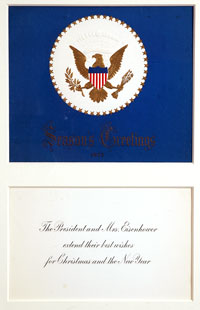 |
[Eisenhower, Dwight D. and Mamie]. Official 1955 Christmas card engraved "Seasons Greetings 1955" in gold against a blue background, below a patriotic gold eagle bearing a red, white, and blue shield and in black against a cream background below: "The President and Mrs. Eisenhower extend their best wishes for Christmas and the New Year." Matted and framed to an overall size of 15¾ x 12 in.
Estimated Value $400 - 600.
| Asking Price
$350 |
Lot 337 |
 |
Fillmore, Millard (1800-1874) 13th President of the United States (1850-53). Partly-printed Document Signed "Millard Fillmore" as President, one page, 10½ x 8 in., Washington, Feb. 16, 1852. Accomplished in manuscript. Ordering the Secretary of State to affix the Seal of the United States to "the envelope of a letter addressed to the President of France, in answer to one just received from His Excellency, relative to the causes which induced him to adopt measures to change the form of Government in that country…." Fine; tone lines from a previous framing and small tape repairs on verso of right edge, none of which affects the text or signature.
Louis-Napoléon Bonaparte (1808-1873) was the nephew and heir of Napoleon I. After spending his youth in exile, he was elected president of the French Second Republic (1848-52). By means of a coup, he, ascended the throne as Napoleon III on Dec. 2, 1852. He ruled until 1870 when the French lost the Franco-Prussian War. He was both the first titular president and the last monarch of France.
The revolution of 1848 swept away the government of King Louis-Philippe, but was unable to remove the conservative and monarchist interests that had supported it. These groups opposed the idea of a republican government and tried to avoid it by electing as president Louis Napoleon, whom they thought they could control. When he came to power, however, the moderate (and sometimes liberal) Louis Napoleon found himself at odds with the conservatives who remained in control of the assembly. As president of the Second Republic, he was limited by law to one term, and the conservatives intended to wait out his term and replace him with one of their own men. Louis Napoleon proposed a constitutional amendment that would allow the president to serve for more than one term, and when this was defeated in the assembly in July 1851. he staged a coup on the anniversary of his uncle's victory at the Battle of Austerlitz.
The legislative assembly was dissolved and the conservatives neutralized, universal suffrage was reestablished and a plebiscite authorizing the revision of the constitution was announced. An attempted radical uprising was repressed and steps were taken to assure a majority in the plebiscite. Victory would, in any event, have been the probable outcome, as the Bonaparte name promised glory, order, and a possible solution to France's political division. The plebiscite was held on December 22 and 23, 1851, and approval of Louis Napoleon was overwhelming.
A new constitution was enacted on January 14, 1852, which gave Louis Napoleon dictatorial powers and created a council of state, a senate, and a legislative assembly subservient to him. Subsequent decrees barred republicans from the ballot and throttled the press. It was clear that Louis Napoleon had become, in essence, an elected monarch. All of this was watched with some trepidation in the United States, which always hoped to see France a republic, and by President Fillmore in particular; the French president was arbitrating a financial dispute between the U.S. and Portugal, and the American people would prefer a decision from a republican leader, rather than a monarch. The situation in France soon received President Fillmore's personal attention, and the New York Times reported on February 12, 1852, that he had "received an autograph letter from Louis Napoleon expressing a desire to cultivate friendly relations with the United States." President Fillmore was quick to respond, sending his reply only four days later.
Estimated Value $8,000 - 12,000.
| Asking Price
$15,000 |
Lot 338 |
 |
Fillmore, Millard. Partly-printed Document Signed "Millard Fillmore" as President, one page, 9¾ x 8 in., Washington, Mar. 11, 1851. Accomplished in manuscript. Ordering the Secretary of State to affix the Seal of the United States to "the Ratification and ratified copy of the Convention with the Mexican Republic for the protection of a transit way across the Isthmus of Tehuantepec…." Fine; a light horizontal fold traverses the top of the "M" and "F" in the signature.
In 1842 Antonio López de Santa-Anna had given José de Garay the concession for a road, railway, or canal across the Isthmus of Tehuantepec. Gaetano Moro surveyed the area and proposed a canal of 161 locks, but lack of funds and the Mexican-American war prevented any progress on the project. The Treaty of Guadalupe Hidalgo ended the war in 1848 and U.S. negotiator Nicholas Trist attempted, with no luck, to win transit rights across the Isthmus of Tehuantepec by paying Mexico an additional $15 million. In 1850, the two countries came to a tentative agreement guaranteeing transit across the isthmus. but a sticking point was reached when the Americans wanted to have the right to intervene militarily of their own accord and not just at the behest of the Mexican government. This created antagonism and fear that the U.S. might try to annex more territory; the Mexican Senate refused to ratify the treaty and in 1851, declared the Garay concession null and void. Eventually, in 1853, with the signing of the Gadsden Treaty, the U.S. gained not only a half million square miles of territory, but also rights of transit over the Isthmus of Tehuantepec.
Estimated Value $3,000 - 5,000.
| Asking Price
$5,000 |
Lot 342 |
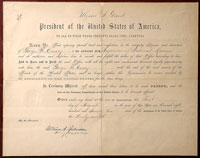 |
Grant, Ulysses S (1822-1885) 18th President of the United States (1869-77). Document signed as President, 1p, 13 x 16½", Washington, Aug. 1, 1872. Appointing George W. Emery Supervisor of Internal Revenue. Countersigned by William A. Richardson as Acting Secretary of the Treasury. Grant's signature has faded to the point of being almost invisible, otherwise fine except for a couple of small fold holes. Matted with a portrait of Grant and framed to an overall size of 20¾ x 33¾".
Estimated Value $200 - 300.
| Asking Price
$100 |
Lot 343 |
 |
Harding, Warren G (1865-1923) 29th President of the United States. A mysterious Autograph Letter Signed "W G Harding," one page, 9¼ x 8 in., n.p., n.d. Being a pencil draft of a night letter ("NL") is at upper right) to Charles E. Sawyer, his personal physician and, later, Surgeon General. In full: "Talked with Pillsbury today and he talked encouragingly. Authorities here not available to him up to noon today. He is to ask my assistance if he fails to secure relief. Said S------ attitude would not delay matters. Seemed to be helping us." Tan paper has file holes at top and one old staple, else fine.
Estimated Value $700 - 900.
| Asking Price
$500 |
Lot 347 |
 |
[Jackson, Andrew]. Miniature Watercolor on Ivory Signed "H.Strong" at center left, 3¾ x 2½ inches. Antique frame is 5 3/8 x 4 inches; written on verso is, "Andrew Jackson, Prest. U.S.A., Hero of New Orleans, painted on Ivory by H. Strong." Very fine.
Howard Strong (1800-1850) was a mid-19th century artist from Illinois, best known for his portraiture. His portrait of Andrew Jackson is based on the work by James Barton Longacre, dated 1829. Longacre's portrait of Jackson first appeared in The National Portrait Gallery of Distinguished Americans (1834-1839), which he worked on with fellow artist James Herring, and which is Longacre's most well known work. The original watercolor of Andrew Jackson is now in the collection of the National Portrait Gallery in Washington D.C. Other notable contributions of Longacre can be found in his portrait engravings in Sanderson's Biography of the Signers of the Declaration of Independence (1820). Reference: Barber, James G. Andrew Jackson: A Portrait Study. Pp. 106-109.
Estimated Value $9,000 - 12,000.
| Asking Price
$8,500 |
Lot 349 |
 |
Kennedy, John F (1917-1963) 35th President of the United States.(1961-63); assassinated. Signature obtained three days before JFK became President-elect, 2¾ x 3¾ in. (Beverly Hills, California, Nov. 2, 1960). On that date, he gave an address at the Beverly Hilton Hotel on "Education: Criticism of the Republican Party." The late Marlene Mancher, who was 20 years old at the time, came to see candidate Kennedy and when she came face-to-face with him after the address, she quickly tore a check in half and ask him to sign the back. She kept the signature for the rest of her life.
Estimated Value $500 - 600.
| Asking Price
$250 |
Lot 354 |
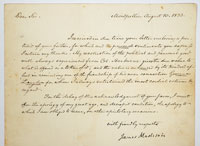 |
Madison, James (1751-1786) 4th President of the United States (1809-1817). Letter Signed, one page, 9¾ x 8 in., Montpellier, Aug. 10, 1833. To John H. Sherburne, thanking him for a portrait of his father. "…My recollection of the political and personal good will always experienced from Col. Sherburne gives the due value to what I offered as a token of it; and the value is enhanced by its kindred effect in reminding me of the friendship of his near connection Governor Langdon [New Hampshire statesman John Langdon, 1741-1819] for whom I always entertained the most cordial esteem and regard. For the delay of this acknowledgement of your favor, I must offer the apology of my great age, and decrepit condition, the apology to which I am obliged to recur, on other epistolary occasions."
John S. Sherburne (1757-1830) served as an officer during the Rvolutionary War and later became a U.S. Congressman and judge. John H. Sherburne, to whom the letter is addressed, wrote a biography of John Paul Jones. Very good; minor toning, normal folds, and two small holes in blank areas. Despite Madison's advanced age and illness, the signature is bold.
Estimated Value $1,500 - 2,000.
| Asking Price
$1,500 |
Lot 357 |
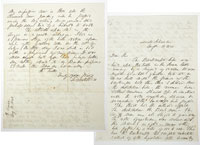 |
Pierce, Franklin. Autograph Letter Signed "Frank. Pierce" as U.S. Senator, two pages, 10 x 8 in., Senate Chamber, Aug. 18, 1841. To H.H. Carroll in Concord, N.H., reporting on proceedings in the House of Representatives regarding a bankruptcy bill. Fine except for minor wrinkling and a couple of tiny edge tears; small paper loss from seal tear on address leaf affects nothing.
In part: "The Bankrupt bill was laid upon the table in the House last evening by a majority of 12 votes….at a caucus last night the friends of the bankrupts took their stand & declared that…other measures should not be sanctioned until the vote of yesterday should be reconsidered & the bankrupt bill passed. This threat had the intended effect. The distributors - the Bank men - the Tariff men were all obliged to give way. The vote of yesterday was reconsidered this morning as agreed in caucus & the bill passed by a vote of 111 to 106. Thus have the Bankrupts the complete & absolute control of the legislation of the country. My impression now is that all the measures now pending will be passed under this logrolling arrangement….The attack upon me in the Argus is a great outrage. I had in a previous stage of the bill voted upon each of the questions taken on the 31st of July. On that day I was sick in bed with a physician by my side…."
Enacted by Congress as a result of an unsavory round of logrolling (trading votes for promises of support for pet projects), the Bankruptcy Act of 1841 (5 Stat. 440) was repealed in 1843 after being on the books for only thirteen months. It did, however, introduce several innovations, such as allowing the debtor to declare voluntary bankruptcy, that have served as cornerstones for every federal bankruptcy law that followed.
The 1841 act was the second of four federal bankruptcy laws enacted by Congress during the nineteenth century (the others were enacted in 1800, 1867, and 1898) and it followed the same general pattern. The two main forces leading to federal bankruptcy legislation were the onset of a major economic depression and political control by the conservative party (the Republicans or their predecessors, the Whigs and Federalists). The strongest support for federal bankruptcy legislation came from conservatives in the Northeast, who viewed such legislation as essential to establishing a commercial society. The most vigorous opponents were liberal lawmakers from the South and Midwest. They worried that federal bankruptcy legislation would threaten the stability of farming interests by, among other things, enabling Northern creditors to foreclose on farms during a temporary downturn.
Estimated Value $5,000 - 7,500.
| Asking Price
$8,500 |
Lot 359 |
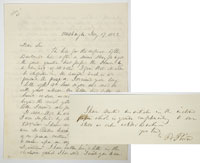 |
Pierce, Franklin. Autograph Letter Signed "Fr. Pierce" as U.S. Senator, 2¼ pages, 10 x 8 in., Washington, Jan. 17, 1842. To H.H. Carroll in Concord, N.H., reporting on proceedings in the House to repeal the bankruptcy bill which had just passed in 1841. Fine except for a couple of tiny edge creases; small paper loss from a seal tear on the address leaf affects nothing.
In part: "The bill for the repeal of the Bankrupt bill, after a severe struggle to get the final question, has passed the House by a majority of 22 votes. I fear that it will be defeated in the Senate. Such is at present the prospect….Our letters had better be burnt as soon as read….I received one from our friend Robinson. It seems that he was not at your caucus. I was surprised by what you say of Dr. Carter & Mr. Low….Robinson says 'some of our friends construe them (the resolutions) into a censure upon our representations to the last Legislature.' I have written him a letter in the conclusion of which I have said 'I wish you to consider this as between ourselves unless you may think proper to show it to Carroll or my friend Dr. Carter.' I hope he will show it to you."
T he Bankruptcy Act of 1841 was enacted by Congress as a result of an unsavory round of logrolling (trading votes for promises of support for pet projects) (5 Stat. 440). It was only on the books for thirteen months, being repealed in 1843. The bill for repeal, which Pierce reports in this letter, was defeated in the Senate.
The 1841 act was the second of four federal bankruptcy laws enacted by Congress during the nineteenth century (the others were enacted in 1800, 1867, and 1898) and it followed the same general pattern. The two main forces leading to federal bankruptcy legislation were the onset of a major economic depression and political control by the conservative party (the Republicans or their predecessors, the Whigs and Federalists). The strongest support for federal bankruptcy legislation came from conservatives in the Northeast, who viewed such legislation as essential to establishing a commercial society. The most vigorous opponents were liberal lawmakers from the South and Midwest. They worried that federal bankruptcy legislation would threaten the stability of farming interests by, among other things, enabling Northern creditors to foreclose on farms during a temporary downturn.
Estimated Value $4,000 - 6,000.
| Asking Price
$8,500 |
Lot 360 |
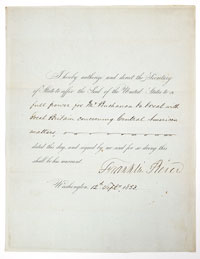 |
Pierce, Franklin. Partly-printed Document Signed "Franklin Pierce" as President, one page, 10½ x 8 in., Washington, Sept. 12, 1853. Accomplished in manuscript. Ordering the Secretary of State to affix the Seal of the United States to "a full power for Mr. Buchanan to treat with Great Britain concerning Central American matters…." A horizontal fold lightly traverses the large, bold signature., else fine.
Because of the possibility of an inter-oceanic canal across Nicaragua, both the United States and Great Britain were wary of each other's presence in Central America. Great Britain had territorial claims in Belize (or British Honduras), the Mosquito Coast, and the Bay Islands. The United States had no territorial claims, but had treaties ready for ratification with Nicaragua and Honduras. The Clayton-Bulwer Treaty was negotiated in 1850 to ensure that neither country obtained exclusive control of the proposed canal. The treaty was signed and ratified by both governments, but before the exchange of ratifications, the British made a declaration that the treaty did not apply "to Her Majesty's settlement at Honduras [Belize] or its dependencies."
The U.S. then followed with a counter declaration, and negotiations went on until a treaty was signed on Oct. 17, 1856, which supposedly removed the difficulties. It is toward the conclusion of this treaty that President Pierce gives James Buchanan the full power to treat with Great Britain and which Buchanan, as President, submitted to the Senate for ratification on Dec. 10, 1856, and ratified himself on Mar. 12, 1857. The treaty was transmitted to London for ratification by the British Government, which then insisted that the U.S. recognize a convention the British had signed with Honduras (Belize) on Aug. 27, 1856. The U.S. rejected the British clause and suggested one of its own, which the British rejected. In his First Annual Message, given on Dec. 5, 1853, Pierce states that "Embarrassing questions have also arisen between the two Governments [British and American] in regard to Central America." When James Buchanan gave his First Annual Message to Congress four years later, he referred to attempts to negotiate the same treaty, which he called "the most unfortunate of all…."
Estimated Value $1,000 - 1,250.
| Asking Price
$1,900 |
Lot 361 |
 |
Polk, James K (1795-1849) 11th President of the United States (1845-48). Partly-printed Document Signed "James K. Polk" as President, one page, 10 x 8 in., Washington, May 6, 1845. Accomplished in manuscript. Ordering the Secretary of State to affix the Seal of the United States to "a full power authorizing William R. King to exchange the ratifications of an additional article to the recent convention between the U. States and France, for the surrender of criminals…." Fine.
In the late 1700s, nations began to arrange extradition treaties among themselves. Before then, people who committed crimes were able to escape punishment by fleeing to another country. Extradition treaties provided that suspected perpetrators of certain crimes be returned to the country in which the crime was committed. This document authorizes the ratification of an additional article to the original Nov. 9, 1843 Convention for the surrender of criminals between the United States and his Majesty the King of France.
In 1844, President Tyler appointed one of Alabama's first two U.S. Senators, William Rufus DeVane King (1786-1853) as minister to France (1844-46), a position which had been vacant for 18 months because of the Senate's feuding with Tyler. King's primary mission in Paris was to keep King Louis Philippe from interfering with U.S. plans to annex Texas. There was some opposition in England and it was believed that France might be persuaded to join in. King, however, received a positive reaction from the French monarch and the annexation took place without opposition from any of the European powers.
King was a Jacksonian Democrat who served in the U. S. House (1811-16) and spent nearly three decades in the U.S. Senate. In 1852, seven years after Polk signed this document, King was elected Pierce's Vice President. Terminally ill with tuberculosis, King went to Cuba to recuperate and, by a special act of Congress, took his oath of office there, the only nationally elected official to be sworn in on foreign soil. He returned to Alabama and died without ever assuming his duties. He was the only Vice President who never presided over the Senate.
Estimated Value $6,000 - 8,000.
| Asking Price
$8,000 |
Lot 362 |
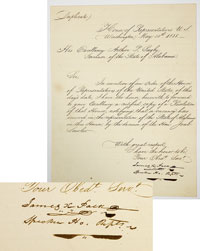 |
Polk, James K. Letter Signed "James K. Polk / Speaker Ho. Repts," one page, 10 x 7½ in., House of Representatives U.S., May 10, 1838. Very fine. Marked "Duplicate," the letter is addressed to Alabama Governor Arthur P. Bagby, notifying him of the death of Alabama representative Joab Lawler. In part: "…I have the honor herewith to forward to your Excellency a certified copy of a Resolution of that House, notifying that a vacancy has occurred in the representation of the State of Alabama in this House, by the decease of the Hon. Joab Lawler." Polk was elected to the U.S. House of Representatives in 1825 and was reelected six times; he served as Speaker of the House from 1835-39. Joab Lawler (1796-1838) served in Alabama's House and Senate before being elected in 1835 to the U.S. House of Representatives, where he served until his death.
Estimated Value $1,200 - 1,500.
| Asking Price
$1,500 |
Lot 363 |
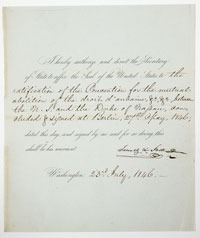 |
Polk, James K. Partly-printed Document Signed "James K. Polk" as President, one page, 9¼ x 7¾ in., Washington, July 23, 1846. Accomplished in manuscript. Ordering the Secretary of State to affix the Seal of the United States to "the ratification of the Convention for the mutual abolition of the droit d'aubaine, &c., &c., between the U.S. and the Duke of Nasssau, concluded & signed at Berlin, 27th May, 1846…." Minor archival repair on verso at horizontal fold and right edge; one tiny tear at blank lower edge; overall, fine.
The "droit d'aubaine" was a medieval practice by which all the property of a deceased foreigner, whether personal property or even his home or other real estate, was confiscated by the state, to the exclusion of his heirs. The practice was abolished in the late Middle Ages, except in France, where it continued in full force until 1791, and then was gradually modified, until it was formally abolished by law 1819.
It is interesting to note that the U.S. signed treaties for the mutual abolition of the droit d'aubaine with the Grand Duchy of Hesse on March 26, 1844, with the King of Bavaria on January 21, 1845, and with Saxony on May 14, 1845, as well as this treaty on July 23, 1846 with the Duke of Nassau, who was Adolphe I, Grand Duke of Luxembourg (1817-1905). He was the last Duke of Nassau, and the fourth Grand Duke of Luxembourg.
Estimated Value $2,500 - 3,500.
| Asking Price
$5,000 |
Lot 365 |
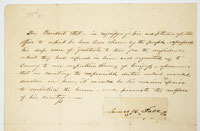 |
Polk, James K. [Martin Van Buren]. Autograph Manuscript with added signature, one page, 10 x 8 in. (Washington, 1836). Written by James K. Polk as Speaker of the House and directed to the leaders of Congress, announcing the election of Martin Van Buren to the Presidency. In full: "The President elect - in signifying his acceptance of the office to which he has been chosen by the people, expressed his deep sense of gratitude to them for the confidence which they had reposed in him, and requested us to convey to our respective Houses of Congress assurances that in executing the responsible duties which would devolve on him, it would be his anxious desire to maintain the honor - and promote the welfare of his country." A signature of Polk has been pasted on to the holograph manuscript. Silked for preservation and overall fine.
Coming to the presidency in the face of impending economic depression and dissension over slavery, Van Buren could only hope that Congress would appreciate his every effort to preserve unity in the land. In the Senate, where the Democrats out-numbered the Whigs, he could be assured of solid support, but in the House of Representatives, where Polk presided over an argumentatie crowd of conservatives and radicals, Van Buren would meet his greatest enemies. As a firm supporter of Jackson's choice for President, Polk found much of the blame for Van Buren's subsequent actions falling on his own shoulders. He endured accusations of favoritism and partiality, not to mention heckling and challenges to a duel.
Four years after Van Buren's term in office ended, Polk would become the first dark-horse candidate to be nominated for President by a major party and would go on to win the election.
Estimated Value $4,000 - 6,000.
| Asking Price
$7,000 |
Lot 373 |
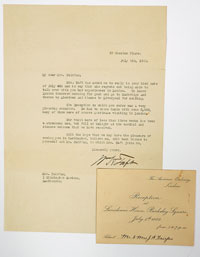 |
Taft, William Howard. Typed Letter Signed "Wm H Taft" on blind-embossed U.S. Embassy letterhead with Great Seal, London, July 5, 1922. Replying for Mrs Taft to Mrs. Fairfax regarding experiences in England. In part: "…The Reception…was a very pleasing occasion. We had to shake hands with some 3,000, many of whom were…Americans visiting in London. Our visit here…has been a strenuous one, but full of delight at the cordial and sincere welcome that we have received…." With Mrs. Fairfax' admittance card to the reception to which Taft refers. Both fine.
Estimated Value $250 - 350.
| Asking Price
$250 |
Lot 378 |
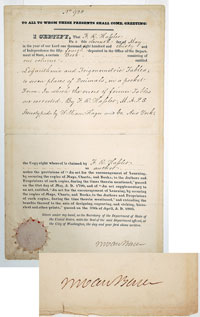 |
Van Buren, Martin (1782-1861) 8th President of the United States (1837-1841). Document Signed "M Van Buren" as Secretary of State, 12¾ x 8 in., Washington, May 11, 1830. Being a handsome and uncommon copyright to F.R. Hassler for a book of logarithms and trigonometric tables. With seal at lower left. A few small edge tears in lower margin, affecting nothing. Matted to 16 x 12 in. Fine.
Estimated Value $500 - 600.
| Asking Price
$350 |
Lot 382 |
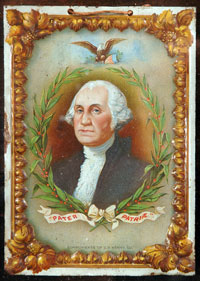 |
[Washington, George]. Chromolithograph on tin by C.D. Kenney, 6¾ x 4¾ in, c. 1890-1910. A bust portrait within a laurel wreath, with "Pater Patriae" below., all within a gold frame. At lower edge is Kaufmann & Strauss Co, NY, 1355. Housed in an 11¼ x 9¼ in. wooden period frame and ready for display.
Estimated Value $300 - 500.
| Asking Price
$250 |
Lot 384 |
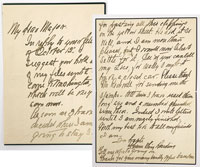 |
Harding, Florence Kling (1860-1924) Wife of President Warren G. Harding;; she served as First Lady from 1921 to 1923. A remarkable Autograph Letter Signed "Florence Kling Harding," 4pp, 6¾ x 5 in., n.p., n.d. (Oct. 1923). To Harding's intimate friend and senior aid, Major O.M. Baldinger, referring to his letter of Oct. 12 and discussing the famously controversial "Harding files" that she spirited away from the White House after Harding's death on August 2. In part: "…I suggest you hold all of my files until I come to Washington. As soon as I have decided where I am going to stay I will…go through them….See if you can sell my Loco [Locomobile], for really I ought to have a closed car. …Please thank Mr. Rockwell for…the stamps…I have used them long ago and a number of hundred since then. Indeed I write letters until I am nearly finished…." A postscript says, "Tell me what's going on…." Some ink brushing, else fine. President Harding died while on a transcontinental public relations tour to try to smooth over some of the damage from the various scandals (the worst being the Tea Pot Dome Scandal) which were rocking his administration. Florence's refusal to allow an autopsy aroused suspicions of the cause of death, even though the cause was officially listed as a stroke. In an attempt to protect Harding's reputation, she burned many of the files to which she refers in this letter.
Estimated Value $700 - 1,000.
| Asking Price
$500 |
Lot 387 |
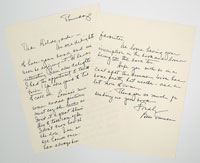 |
Truman, Bess (1885-1982) Wife of President Harry S. Truman; First Lady (1945-1953). Autograph Letter Signed "Bess Truman," on embossed personal stationery, 2 pp, 8¼ x 6 in., n.p., n.d. To chanteuse Hildegarde, thanking her for her book, "…We loved having your inscription in the book and loved being in the book too…." Fine. With transmittal envelope.
Estimated Value $150 - 250.
| Asking Price
$100 |
Lot 388 |
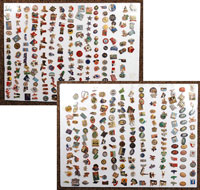 |
Secret Service Officer's Collection of 402 Pins. Collected by former Secret Service agent Adrienne Coleman. The 402 brightly-colored pins depict First Lady functions and Presidential Protective Division examples, as well as special events (9/11), holidays, and field offices in Rome, Paris, etc. The pins were not issued for security purposes; they were issued for collecting purposes only . Several pins represent the White House; as well as various cities (for example, San Francisco by a streetcar and Dallas by a boot) and states, the G-4 summit, campaigns for Ford, Carter, Reagan, Clinton/Gore, John Paul II (50th anniversary of the UN), the Olympics, various field offices of the Secret Service, inaugurations, Fourth of July at the White House (1996, 2002), political conventions, etc. These were collected over a 16 year period (1993-2009) by Agent Coleman, who is retired from the Secret Service.
Estimated Value $1,200 - 1,800.
| Asking Price
$1,150 |
Lot 389 |
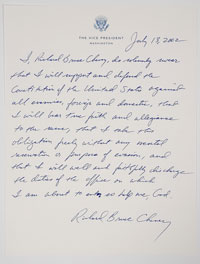 |
Cheney, Dick (1941 -) 46th Vice President of the United States. Autograph Manuscript Signed "Richard Bruce Cheney," on The Vice President letterhead, one page, 11 x 8½ in., Washington, July 13, 2002. Almost six months after he took the Oath of Office, Vice President Dick Cheney, writes out the entire oath and signs it. Pristine condition.
In full: " I Richard Bruce Cheney, do solemnly swear that I will support and defend the Constitution of the United States against all enemies, foreign and domestic, that I will bear true faith and allegiance to the same, that I take this obligation freely without any mental reservation or purpose of evasion, and that I will well and faithfully discharge the duties of the office on which I am about to enter so help me, God."
Estimated Value $1,500 - 2,500.
| Asking Price
$2,750 |
Lot 390 |
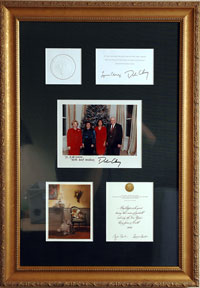 |
Cheney, Dick. Christmas Photo Signed "Dick Cheney" with a black marker in lower border, 7¼ x 9 in., n.d. The photo has a printed inscription "To Adrienne With best wishes." Adrienne Coleman was a Secret Service agent at the White House and is pictured (in the green blouse) in the photo with Dick and Lynn Cheney. Handsomely matted with the 2001 presidential and vice presidential Christmas cards, which have autopen signatures, and framed to an overall size of 30½ x 21¼ in. Very fine condition.
Estimated Value $300 - 500.
| Asking Price
$300 |
Lot 393 |
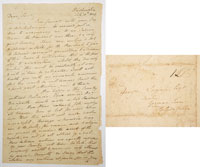 |
Law, Thomas. Autograph Letter Signed "T. Law," 2pp., folded sheet with integral address leaf.Washington, July 18, 1804. Address leaf torn from opening with old folds. To George Logan with reference and critique of Hamilton-Burr duel, attendance at an Indian Dance attended by President Jefferson, correspondence to James Madison about civilizing Indians, and other political activities. Signed at the bottom of the second page.
Thomas Law, an Englishman who was one of Washington D.C.�s first investors, was married to Elizabeth Parke Custis, granddaughter of Martha Washington. George Logan was an American physician and U.S. Senator for Pennsylvania. Law begins his letter mentioning that he received one from Logan via noted naturalist C.S. Rafinesque, who "arrived just in time to accompany me to an Indian dance." On July 11, the first delegation of Osage Indians arrived in Washington, having been sent there from St. Louis by Meriwether Lewis. Law continues "The President [Thomas Jefferson] was there & a very great Crowd. I have been writing to Mr. Maddison a talk for the President to give the Indians recommending agriculture & a division of their lands to cultivators, this is the first step to civilization. Whilst they are only hunters, they must be constantly at war, & will in time be extirpated." Law was indeed qualified for such advice, having been a noted administrator for the East India Company.
The letter continues "How happy is this Country without Colonies, large armies &c. Bonaparte would make a bad President here." Next Law addresses the Hamilton-Burr duel, which had taken place the week prior. "Hamiltons untimely fate employs all tongues. Burr is lost for ever. Let us hope that this event will render dueling disgraceful. Revenge or Cowardice bring men to the feild - for common sense & religion are against the practise…" The letter concludes with a lengthy commentary on the ill effects of war, before turning to the election of 1804 which pitted Jefferson against Charles C. Pinckney of South Carolina: "…Genl Washington & Jefferson have not encreased offices or conferred appts upon their state favorites--Adams…may be regretted by Massachusets - of what consequence is it to any State whence the President is elected. South Carolina has done wrong and should her slaves create an insurrection, very few States would willingly risque their lives & spend their fortunes to suppress it." The letter includes a postscript mentioning John Bartram, with Law asking Logan to "pray desire him to send any seeds of American plants & flowers to Lady Rumbold Southampton Harts…" Excellent content.
Estimated Value $1,500 - 2,000.
| Asking Price
$750 |
Lot 398 |
 |
King Hussein and Queen Noor (1935-1999) King of Jordan (1952-99) and his 4th wife, American-born Lisa Najeeb Halaby (1951-), who took the name Noor al Hussein.Card signed as King and Queen of Jordan, below an engraved greeting: "With our best wishes, regards and the Season's Greetings," facing a photograph of three of their children, 8 x 10 in., c. 1980s. The brown cardstock covers have an embossed crown and is bound with a green, white, and red ribibon. Very fine.
Estimated Value $350 - 450.
| Asking Price
$300 |
Lot 400 |
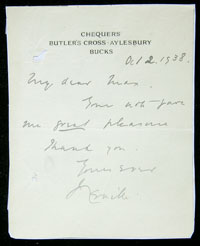 |
Chamberlain, Neville (1869-1940) Prime minister of Great Britain (1937-1949), best known for his appeasement policy toward Nazi Germany; he signed the Munich Accord with Hitler on Sept. 29, 1938, which conceded the Sudetenland area of Czechoslovakia. Historic Autograph Note Signed "Neville," one page, 6¼ x 5 in., Oct. 2, 1938. Written to powerful newspaper baron Max Aitken, 1st Baron Beaverbrook (1879-1964) three days after Chamberlain had traveled to Munich and signed the agreement with Hitler which was supposed to bring "peace in our time." Chamberlain writes, "My dear Max, Your note gave me great pleasure. Thank you. Yours ever Neville." The note paper, which is engraved "Chequers / Butler's Cross Aylesbury / Bucks," has a couple of small holes in blank areas and is backed by a white sheet of paper.
According to A.J.P. Taylor's biography of Lord Beaverbrook, Beaverbrook had written Chamberlain on September 28, saying "My dear Neville, My faith is very great, but not so immense as my joy and delight over your reward…." (p. 385)
On September 30, the headline of Beaverbrook's The Daily Express read, "Britain will not be involved in a European war this year, or next year either." On September 1, 1939, Germany invaded Poland and on September 3, Britain declared war on Germany.
Estimated Value $5,000 - 10,000.
| Asking Price
$5,000 |
Lot 401 |
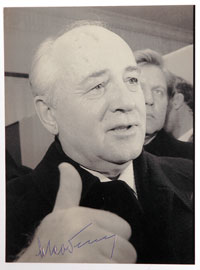 |
Gorbachev, Mikhail (1931 -) Last head of state of the Soviet Union, which collapsed in 1991. Photograph Signed in Russian at lower edge, 7 x 5 in., n.p., n.d. Fine.
Estimated Value $200 - 250.
| Asking Price
$150 |
Lot 402 |
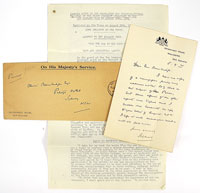 |
Jellicoe, John R. - 1st Earl Jellicoe (1859-1935) British admiral; Commander-in-Chief of the Grand Fleet during the early part of World War I; Governor-General of New Zealand (1920-24). Autograph letter signed ("Jellicoe") as Governor-General of New Zealand, 1p, 8 x 5", Wellington, New Zealand, Sept. 8, 1921. To Oliver Dainbridge, enclosing a copy of Jellicoe's speech (present) "For The Sea Is Our Life," a review of England's traditional policy. With holograph envelope.
Estimated Value $75 - 125.
| Asking Price
$38 |
Lot 417 |
 |
London, Jack (1876-1916). American novelist and adventurer. Typed Letter Signed "Jack London," one page, 11 x 8½ in., Glen Ellen, Ca., Jan. 27, 1910. To the International Press Bureau: "Your letter…inquiring about the serial rights of MARTIN EDEN has been forwarded…to me. The control of serial rights in MARTIN EDEN is vested in me. However, The Macmillan Company has already published the book, so it will have some say-so in the matter….address yourself directly to Mr. George P. Brett, President of the Macmillan Company….Any arrangement you may come to, which is satisfactory to him, will be satisfactory to me…." Normal folds and one staple mark, else fine.
Estimated Value $900 - 1,000.
| Asking Price
$900 |
Lot 422 |
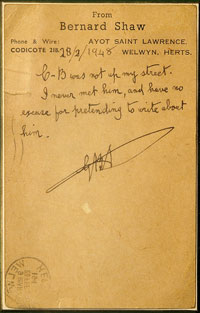 |
Shaw, George Bernard (1856-1950) Irish playwright and literary critic; the only person to win both the Nobel Prize for Literature (1925) and an Oscar (1938). Autograph Letter Signed with initials ("GBS"), on his printed postcard, 5½ x 3½ in., Ayot Saint Lawrence, Welwyn, Herts, Feb. 18, 1948. Responding to a request (present) to say something nice about Sir Henry Campbell-Bannerman, Shaw writes, "C-B was not up my street. I never met him, and have no excuse for pretending to write about him." Fine. Matted with a photo and the letter Shaw is answering and framed to an overall size of 16½ x 15¼".
Estimated Value $300 - 400.
| Asking Price
$150 |
Lot 423 |
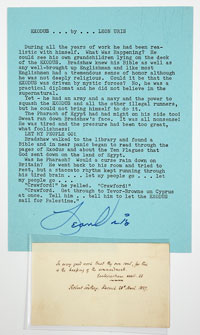 |
Southey, Robert and Leon Uris. Autograph Quotation Signed "Robert Southey, Kerwick 28th March, 1837," 2¾ x 4½ in. The 1813 Poet Laureate quotes Ecclesiastes 23:22. With a typed page signed "Leon Uris" quoting from his novel Exodus, 8 x 6 in. Very fine.
Estimated Value $100 - 300.
| Asking Price
$50 |
Lot 424 |
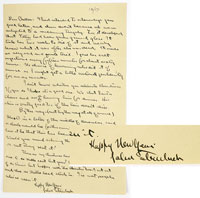 |
Steinbeck, John (1902-1968) American novelist whose books gave expression to the social and economic tensions of the time. He won the Pulitzer Prize for The Grapes of Wrath (1939) and the Nobel Prize for literature in 1962. Autograph Letter Signed "John Steinbeck," one page, 8½ x 5½ in., n.p. (but Monte Sereno, Ca.), Dec. 17, n.y. (mid 1930s). To his publisher Robert O. Ballou about the death of Tillie Eulenspiegel, Steinbeck's Airedale, who was Charlie's predecessor: "…we were subjected to a maddening tragedy. For it developed that Tillie [who is said to have eaten a first draft of Steinbeck's Of Mice and Men] had been given ground glass. It took her two weeks to die of it….It made us very sad and quite tired….No chance of knowing who did it of course as I might get a little national publicity for an ax murder.
I don't know whether you celebrate Christmas. If you do I hope it's a good one. We shot Santa Claus and are having him for dinner. His skin is pretty good too if the hair doesn't slip. By the way (not by the way at all of course) Mrs. O….said a check would be forthcoming on the first of December….These are my Christmas cards. Have you heard of the one C. de Mille sent last year? Beautiful reproductions of da Vinci's Last Supper with the Christus head cut out and the de Mille head stuck in….Happy New Year." Fine.
Estimated Value $3,000 - 4,000.
| Asking Price
$2,750 |
|
|